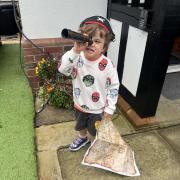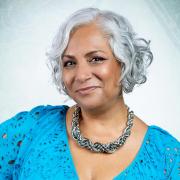Achieving the goal of recovery is only the start of a lifetime commitment. Fallen Angels Dance Theatre in Chester gives support to those who need it most.
Paul Bayes Kitcher brings joy. He brings joy to people struggling with mental health and in recovery from alcohol or substance-abuse addiction, where every day is a new day to hold in place, to keep going, to find a safe path forward. He brings joy to the friends, relatives and supporters of those in recovery, who can see the power of what he does in action, on stage and in every day. He brings joy to those who love live performance, dance and storytelling. Paul Bayes Kitcher is the founder of Fallen Angels Dance Theatre, the only dance company in the UK providing dance theatre workshops and teaching for people in recovery from addiction, and is himself in recovery.

Paul joined the high-pressure world of ballet at the tender age of 11, when he won a place at the Royal School of Ballet, in London, training there and with Ballet Rambert, before joining Scottish Ballet and then the Birmingham Royal Ballet, where he proved his talent and his skill in multiple soloist and principal roles.
“I was bitterly unhappy,’ Paul says, ‘and had no idea why. I used alcohol and drugs to cope and it wasn’t until I was in my own recovery journey that I came to understand myself and why I had been so unhappy.
”It was, for me, a brutal lifestyle. I never felt like I was good enough. There I was, a member of Birmingham Royal Ballet, dancing as a soloist and in principal roles, yet I never felt like I was good enough. If you spend all your time seeking perfection, looking in the mirror and seeing only your faults, never acknowledging achievements, we shouldn’t be surprised there’s a negative effect.”
It seems ironic, therefore, that it is dance that sits at the root of his own recovery and at the heart of the Fallen Angels Dance Theatre.

“It was the combination of my own mental state and the demands I placed on myself as a professional ballet dancer,’ he says. Now for me dance is healing and meditative, not pure brutal technique. From the age of 10 I was looking at my faults and judging myself. Today, I use dance to release tensions, to put a physicality to my emotional and mental state and let it out.
“There are a lot of mental health programmes, and rehab and recovery programmes, that focus wholly on mental health through talking. What Fallen Angels does, among many other things, is link physical movement to emotion and expression. It’s incredibly powerful.”
It was two years into his own recovery when Paul’s life was changed forever by a meeting at The Lowry theatre.
“I was in a performance at the Lowry, based around addiction, and a lady in the audience, who was with rehab centre Trust the Process Warrington, came to find me and asked if I would go and teach dance at the centre. I went and did almost a year and developed ways of taking people on a positive journey with dance regardless of their age or physical fitness. I worked on how to look at art and creative writing and how to put that into dance and movement, creating natural movements that expressed the feelings we wanted to use to tell the stories. I learned to choreograph this process and bring performances to the stage.
“‘I call it movement meditation, where we express our emotions physically, when we can’t always express with words.”

This time with Trust the Process showed Paul there was a hugely powerful opportunity here to support people and help them keep walking the path to maintaining their recovery.
'We did a performance and it was really powerful. Addiction is a physical as well as a mental illness; rehabs will do a lot of work on the mind and not on the body, so I started from that point, tapping into the physicality of dance to heal the mind. A lot of people we work with have got complex PTSD and trauma, which is held in the body, so releasing those energies in a safe environment helps to heal from within, physically, which obviously has an effect on their minds.
as he landed the music stopped and it was just the sound of his hand striking the stage. The audience erupted."
‘There’s something about coming together and doing a performance, with people who even weeks before wouldn’t have been able to get out of their house, and are now performing on a stage, to an audience, that is a clear demonstration of the power and effectiveness of what we do.’
On completing his time in Warrington, Paul and his wife, Claire Morris, applied for and won a grant from Arts Council England to create a performance working with both professional dancers and with non-dancers in recovery.
‘We needed a name, and I remembered a really powerful artwork by Banksy, Fallen Angel, of a homeless man with a bottle by his feet and a cigarette in his hand. It really spoke to me and I knew it would be a great name for what we wanted to do.
‘Since that first project, we have been going 16 years and have been running two ongoing programmes, in Chester and in Liverpool, and a series of short term or one-off projects elsewhere. We have had hundreds of participants and every single one has said how much it has helped them.’
Participants in Fallen Angels workshops and programmes come from various paths, recommended by support workers, the NHS and rehab centres across the area.
“We are very well-known now in this area, and we spend a lot of time going out and meeting with the various agencies in the region, showing what we do and how we support their own work,” Paul says.

As well as a rolling series of projects in Chester and Liverpool, Fallen Angels has run workshops in Leigh and Salford, and Paul has run similar programmes with prison inmates, resulting in one of the most powerful moments of feedback in his career.
‘I was working with 15 young men, two of whom were on life sentences. These lads were fit and tattooed and very unsure about any of it. We spent two weeks talking, about me, about recovery, about what we might achieve, then started to create a performance. On the night, the two on life sentences were really nervous, and there was a big audience. They were doing a duet (although hated the word duet) and there was a moment when one was thrown high into the air, twisted round and landed crouching over and as he landed the music stopped and it was just the sound of his hand striking the stage. The audience erupted. Afterwards I had queues of huge blokes asking when we’d be back and insisting they would be part of the next one.’
The next one, and the one after that, and indeed the continuation of Fallen Angels lies in funding, of course, which is an ongoing, every single day demand for Paul and Claire.
“Everything we do is on a project-by-project basis,” Claire says. “Once the project is complete, the funding is over. We are continuously applying for grants and for funding. We are a charity, so we can fundraise too, of course, but there is no single, continuous income stream. We benefited from a National Lottery Community Fund donation, but this is due to end soon. We’re bidding again and have all our fingers and toes crossed.
“We can bid for Arts Council funding where we do projects with both professional dancers and our own recovery dancers. We had a fabulous project last year where we developed a show and premiered here at Chester Storyhouse before taking it to London’s Royal Opera House, and we have been lucky enough to get funding for a similar project this year. In June we will be developing a performance in collaboration with two or three Royal Ballet dancers, some of our own Fallen Angels, and the New Note Orchestra, a Brighton-based orchestra designed to support people affected by addiction. They are composing an original score and we shall choreograph the dance.”

Arts as therapy has a long and well-regarded history, and it seems that what Paul and Claire are doing here is to push our understanding of how dance and movement as an art form can so impactful in the lives of those living in recovery.
“Addiction is a very selfish thing,” Tony says. “It’s a vampire that makes put yourself at the centre of everything - every action and every decision is always all about you. Being a Fallen Angel is the opposite of that. You get out of yourself, you have to look outwards. You are part of a collaboration and must commit to and support your fellow Angels. Selfless acts give you freedom from yourself, give you purpose.
“What we do here isn’t just about dance. It’s about putting into society, not just taking out. It’s making change in people’s lives where they had thought no change was possible.
“At the close of all our performances we run a Q&A with the audience, and when our dancers tell their stories, that’s when people really get it, really understand that what we’re doing here is not a ‘nice to have’, but something that is fundamentally changing lives.
“We will keep it going as long and as far and as wide as we are able.”




























